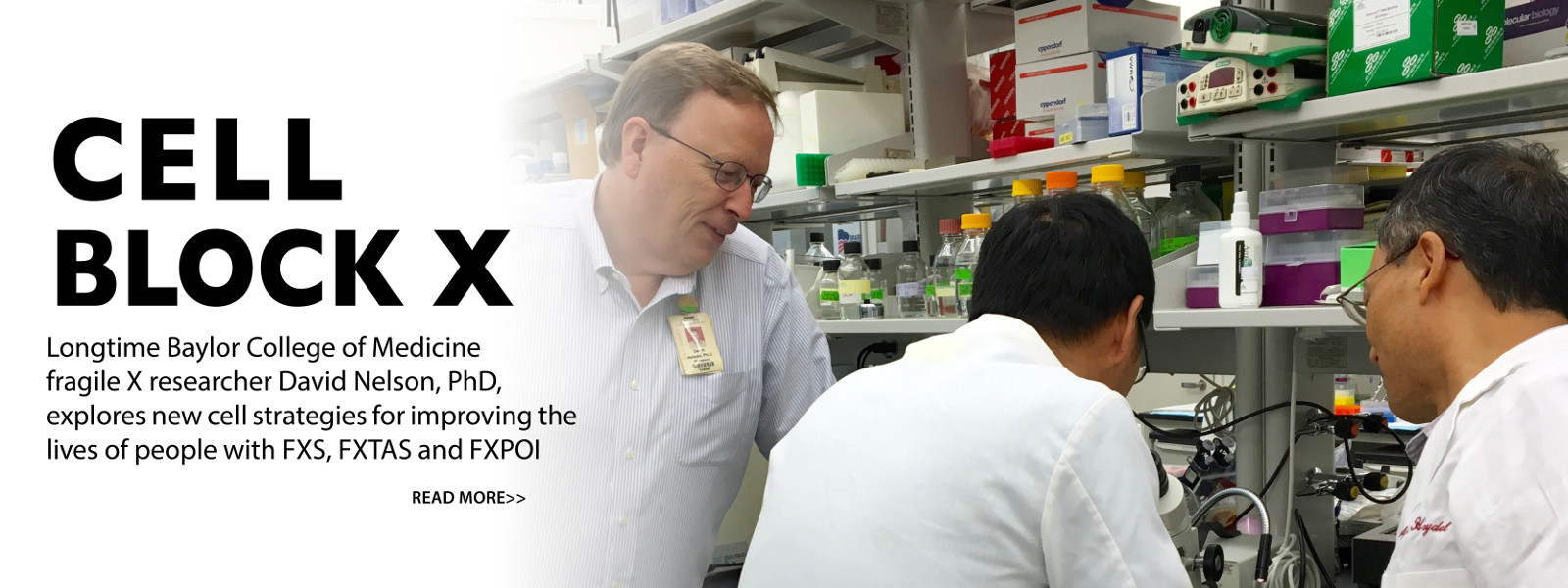Researcher David Nelson, PhD, Explores New Cell Strategies for Fragile X Syndrome, FXTAS and FXPOI

It’s rare to find a researcher working on the Big Three — Fragile X Syndrome (FXS), Fragile X-associated Tremor/Ataxia Syndrome (FXTAS) and Fragile X-associated primary ovarian insufficiency (FXPOI).
Then again, David Nelson, PhD, is the rare bird.
Nelson is a professor of Molecular and Human Genetics, Baylor College of Medicine, and director of Baylor’s Graduate Program in Integrative Molecular and Biomedical Sciences. He has been involved in FXS research since the late 1980s where he helped identify the mutation and the FMR1 gene.
These days, researchers in Nelson’s lab at Baylor are studying FXS, FXTAS and FXPOI using mouse models. The goals are to understand which cell/tissue types contribute to these disorders, which genes are involved and what can be done to modify the course of the disorder as a result of these findings.
“We are developing mice that will help us determine what tissue type is responsible for the effects of the FMR1 premutation on female reproduction,” said Nelson, who has been the editor-in-chief, American Journal of Human Genetics, since 2012. “We will express the mutated FMR1 in various tissues and study the pathology in oocytes and support cells. This may help determine if this is an effect from neurons or in the ovary itself.”
Potential benefits from Nelson’s work will be to know the right tissues to target and the times when treatment is necessary.
“In FXS, we have used mice to demonstrate that gain or loss of FMRP at later ages can result in effects similar to those in mice that made normal or no FMRP from conception, respectively,” said Nelson, who won the Barbara Bowman Distinguished Texas Geneticist Award in 2010 and is an AAAS Fellow. “This work suggests that treatment in FXS could be beneficial beyond early life.”
Nelson credits FRAXA for funding mutant mice for laboratories around the world to carry out critical Fragile X research.
“We have been doing this for about a decade now, and have provided hundreds of mice to dozens of lab groups, facilitating their efforts,” he said. “FRAXA has been an incredible force in Fragile X research. A very large share of the credit for recent progress in FXS is owed to FRAXA. FRAXA has done a great job with convincing industry to see FXS as an interesting problem, and there has been significant expenditure there.”
Nelson, who earned a PhD, from Massachusetts Institute of Technology, and a Post-Doctoral Fellowship at National Institutes of Health, said he literally stumbled into the Fragile X mutation in the course of mapping and sequencing the human X chromosome.
“When I learned about the disorder and how interesting it was from a genetics standpoint, I joined forces with others and we collaborated to discover the mutation and the gene,” he said. “I’ve worked on FXS ever since and it has been the defining area of research for my career in the last 25 years.
If there’s one thing Nelson could change it would be the visibility and awareness of Fragile X.
“For 25 years, I have expressed concern about how relatively poorly known FXS is,” he said. “Among neuroscientists and geneticsts, this has changed. Unfortunately, FXS is still largely unknown to the general public. We need to do a better job of publicizing this disorder. This would help with funding and assist with screening.”
Looking back, Nelson said he values and appreciates the opportunity to get to know people with FXS and their parents and siblings.
“It has been a hugely motivating factor for me as well as for my students and postdocs,” he said. “We have learned so much from people who have coped with such adversity in their lives. It has been quite inspirational. It has been a privilege to be able to help.”
Written by
Theodore Coutilish, MA
FRAXA Board Member
Theodore Coutilish a distinguished leader in marketing communications, serves as the Assistant Director of Strategic Engagement and Communications at the University of Michigan. Dedicated to advancing Fragile X research and awareness, he has long advocated for this cause, motivated by his son, Andrew, who has Fragile X syndrome. Residing in Grosse Pointe Shores, Michigan, with his wife, Mary Beth Langan, Theodore earned a BA in Print Journalism from Wayne State University and an MA in Communications from the University of Detroit Mercy.

